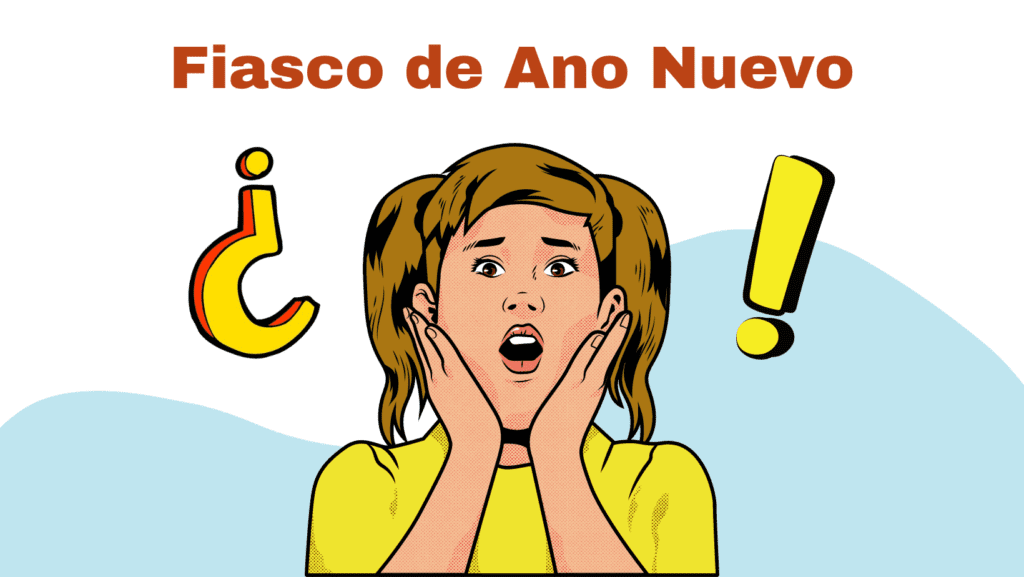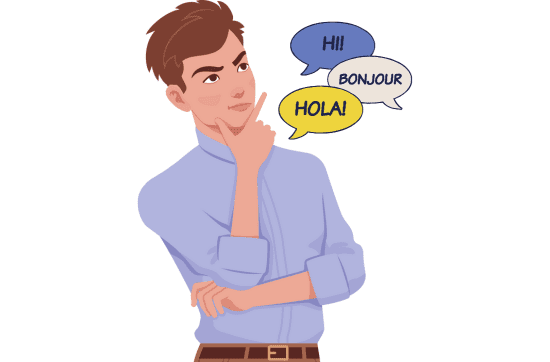
Happy New Year’s in Spanish?
If you don’t know how to wish someone a Happy New Year’s in Spanish, stick with us and we will teach you a few phrases. As some of you may already know “Feliz Año Nuevo” is the Spanish phrase for Happy New Year’s.
Just be cautious not to accidentally bring up a different kind of ‘happiness. That’s exactly what happened to Tim Mid when meeting his fiancé’s family. He mispronounced the Spanish word “año” (year) and accidentally said “ano”, which refers to our rear sphincter.

The Linguistic Dreamer
Imagine Tim Mid, the self-proclaimed language wizard. Spanish was his Everest, and “Feliz Año Nuevo” was his Everest’s peak. He rehearsed it with the fervor of an aspiring musician tuning their masterpiece. It was his linguistic pièce de résistance.
Tim Mid needed to impress his girlfriend’s family. He travels for the first time to Peru to visit his girlfriend. After Machu Pichu, they decided to go to the Peruvian North to spend time with her family. They had to get ready for the family party for New Year’s.

¿Feliz ano nuevo o feliz año nuevo?
Fast forward to the eve of New Year’s. Tim’s hyped up, ready to showcase his linguistic prowess. He’s been drinking with his girlfriend’s family and friends while practicing that specific phrase in his mind—especially in the restroom where he will feel more confident to raise his voice.
When the New Year arrives, he opens his arms ready to hug his friends. He already had two tequilas and three pisco sours while he continues drinking cerveza. He is being chosen to deliver a New Year’s speech this time.

Showing Off his Spanish!
So, Tim’s all hyped up to showcase his Spanish skills to his buddies, who are all fluent Spanish speakers. When the moment arrives, everyone falls silent, anticipating Tim’s speech. But, oh boy, he starts feeling a bit jittery.
His fingers nervously fumble around his wrist, sweat streaming down his face, and he’s trying to sip his water as if it could calm his trembling lips.
Trying to regain composure, Tim walks up to the podium, glancing at his pals. He had already forgotten the entire speech, but at least he felt confident about his pronunciation of ‘¡Feliz Año Nuevo!’
Over time, Tim has learned to hide his timidity: He puts on an act, pretending to exude confidence like a turbo-charged motivational speaker, forcing a smile to conceal his nervousness. With a feigned joker’s smile, he belts out, “¡Feliz Ano Nuevo!”

The Awkward Pause
The room falls into a sudden hush, not the eerie kind, but the “Wait, did Tim just say what we think he said?” type. His friends exchange bewildered glances, trying to process whether Tim wished them a Happy New… what now? Tim stands there, unaware of the brewing storm.

The Hilarious Mishap
Tim’s innocent omission of a single mark, the tilde, turned his well-intended greeting into something entirely different. Instead of “Happy New Year,” he unwittingly wished everyone a “Happy New Anus!” Cue the collective gasp, followed by an eruption of laughter that could rival a volcano’s rumble.

Embracing the Oops Moment
Tim’s face? A stunning shade of crimson, like a walking, talking tomato. But instead of vanishing into thin air, he decides to swim in the pool of laughter. He starts dropping jokes like confetti, becoming the accidental life of the party.

The Legendary Aftermath
That night marked the genesis of “Feliz Ano Nuevo,” Tim’s accidental catchphrase. It became the party’s encore, a story retold with different nuances at every gathering for the rest of the year and the new years to come.

The Takeaway
Folks, here’s the moral: Life’s most memorable chapters often start with an awkward hiccup. And hey, that tiny squiggle, the tilde, holds the power to turn a “Happy New Year” into a “Happy New Rear,” making you the unexpected star of a comedy show you never auditioned for.
Because, in the end, a language hiccup can become the gem of the party, an anecdote that keeps on giving, and a bond that ties friends together with an unbreakable thread of laughter and shared mishaps!

Learning to Laugh!
Laugh to live! Laugh to learn! Laughing is the language and social glue. Remember, humor serves as a powerful tool to connect with others and foster relationships across diverse languages and cultures. Embrace the ability to laugh at yourself!
If you wish to further explore the captivating realm of Spanish, consider joining Kasa De Franko’s virtual Spanish classes.
Our skilled instructors will accompany you on your language journey, sharing their amusing anecdotes and offering valuable insights into the idiosyncrasies of the Spanish language.

Wanna Learn More?
Wanna dive deeper into these language goof-ups? Check out our series ‘Funny Language Blunders.’ Did this article tickle your funny and, maybe, sexy bone? No I didn’t say boner: I may have mispronounced it with my Spanish accent.
Anyways, if interested in learning sexy and dirty phrases in Spanish, you can’t miss ‘Spanish is Sexy’ and ‘Dancing with Words.’ They’ll take your knowledge of spicy Spanish words to the next level.

Learning can be painful at times!
At Kasa de Franko, we get that these cringy moments can pop up anytime while learning Spanish. But hey, as awkward as they might feel, they’re all part of the learning process.
That’s why we’re dishing out free lessons for New Years. If you’ve enjoyed this article, we’re here to give you more reasons to crush it in Spanish—while steering clear of those embarrassing slip-ups. Happy New Year from Kasa de Franko Team!

Complimentary Classes at KDF
Snag a free session at Kasa de Franko to ace those everyday phrases. Our classes aren’t just about picking up slang; Spanish is a treasure trove of richness and depth.
Redeem your free Spanish session today and mingle with fellow language enthusiasts. Just hit the button below to kick off your language-learning adventure. Now that you know how to say “Happy New Year” in Spanish?, you can tell everyone “¡Feliz Año Nuevo!” Make sure you pronounced the letter “ñ” properly though.

Red for Free!
Immerse yourself in the allure of Spanish and its countless offerings to keep laughing while learning, always remembering:”

